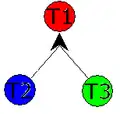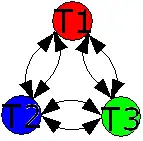| Authors |
|---|
A B C D E F G H I J K L M N
O P Q R S T U V W X Y Z & |
|
| Pask, Gordon (1975). Conversation, Cognition and Learning. Elsevier. |
Chronology
- Wilson, Edward (1998). Consilience: The Unity of Knowledge. New York: Knopf. [^]
- Pask, Gordon (1996). "Heinz von Foerster's Self-Organisation, the Progenitor of Conversation and Interaction Theories." Systems Research, 13(3): 349–362. [^]
- Pask, Gordon (1993). Interactions of Actors (IA), Theory and Some Applications.
- Swanson, Don R. (1986). "Fish oil, Raynaud's Syndrome, and Undiscovered Public Knowledge." Perspectives in Biology and Medicine 30 (1): 7-18. [^]
- Simon, Herbert (1977). Models of Discovery: And Other Topics in the Methods of Science. Springer [^]
- Wilson, Patrick (1977). Public Knowledge, Private Ignorance: Toward a Library and Information Policy. Greenwood Publishing Group. [^]
- Kochen, Manfred, ed. (1975). Information for Action: from Knowledge to Wisdom. New York: Academic Press. [^]
- Pask, Gordon (1976). Conversation Theory, Applications in Education and Epistemology. Elsevier.
- Pask, Gordon (1975). Conversation, Cognition and Learning. Elsevier. [^]
- Pask, Gordon (1975). The Cybernetics of Human Learning and Performance. Hutchinson.
- Wilson, Edward (1975). Sociobiology: The New Synthesis. Harvard University Press. [^]
- Kochen, Manfred (1972). "WISE: A World Information Synthesis and Encyclopaedia." Journal of Documentation, 28: 322-341. [^]
- Kochen, Manfred (1969). "Stability in the Growth of Knowledge." American Documentation, 20 (3): 186-197. [^]
- Bernal, J. D. (1939). The Social Function of Science. London: Routledge & Kegan Paul Ltd. [^]
- Wells, H. G. (1938). World Brain. Garden City, NY: Doubleday, Doran & Co. [^]
- Ogden, C. K. & I. A. Richards (1923). The Meaning of Meaning: A Study of the Influence of Language upon Thought and of the Science of Symbolism. London: Routledge & Kegan Paul Ltd. [^]
Notes
|
|
 1900s category ^ 1900s category ^ |
| '00 |
'01 |
'02 |
'03 |
'04 |
'05 |
'06 |
'07 |
'08 |
'09 |
| '10 |
'11 |
'12 |
'13 |
'14 |
'15 |
'16 |
'17 |
'18 |
'19 |
| '20 |
'21 |
'22 |
'23 |
'24 |
'25 |
'26 |
'27 |
'28 |
'29 |
| '30 |
'31 |
'32 |
'33 |
'34 |
'35 |
'36 |
'37 |
'38 |
'39 |
| '40 |
'41 |
'42 |
'43 |
'44 |
'45 |
'46 |
'47 |
'48 |
'49 |
| '50 |
'51 |
'52 |
'53 |
'54 |
'55 |
'56 |
'57 |
'58 |
'59 |
| '60 |
'61 |
'62 |
'63 |
'64 |
'65 |
'66 |
'67 |
'68 |
'69 |
| '70 |
'71 |
'72 |
'73 |
'74 |
'75 |
'76 |
'77 |
'78 |
'79 |
| '80 |
'81 |
'82 |
'83 |
'84 |
'85 |
'86 |
'87 |
'88 |
'89 |
| '90 |
'91 |
'92 |
'93 |
'94 |
'95 |
'96 |
'97 |
'98 |
'99 |
| 2000s category |
| '00 |
'01 |
'02 |
'03 |
'04 |
'05 |
'06 |
'07 |
'08 |
'09 |
| '10 |
'11 |
'12 |
'13 |
'14 |
'15 |
'16 |
'17 |
'18 |
'19 |
|
|
|
|
http://books.google.com/advanced_book_search
 |
|---|
| The shade of the bar looks invariant in isolation but variant in context, in (favor of) sharp contrast with the color gradient background, hence an innate illusion we have to reasonably interpret and overcome as well as the mirage. Such variance appearing seasonably from context to context may not only be the case with our vision but worldview in general in practice indeed, whether a priori or a posteriori. Perhaps no worldview from nowhere, without any point of view or prejudice at all!
Ogden & Richards (1923) said, "All experience ... is either enjoyed or interpreted ... or both, and very little of it escapes some degree of interpretation."
H. G. Wells (1938) said, "The human individual is born now to live in a society for which his fundamental instincts are altogether inadequate." |



